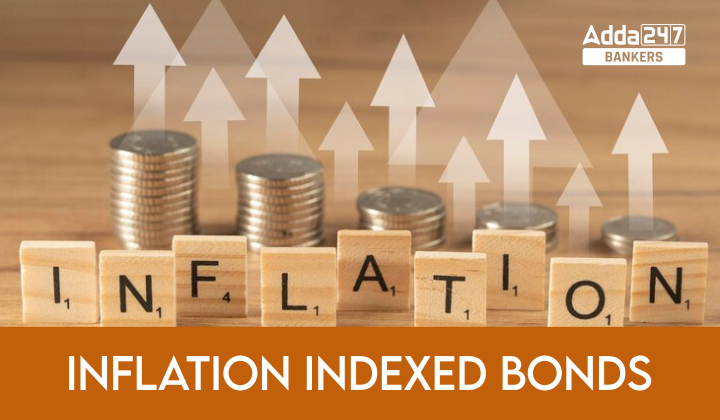Table of Contents
Inflation Index Bonds, also known as Inflation-Indexed Bonds (IIBs), are a type of government security issued by the government of a country to protect investors from inflation. These bonds are designed to help investors preserve the purchasing power of their investments even in times of rising inflation. The inflation index bond is an important topic for banking awareness. The question on inflation-Indexed Bonds (IIBs) has also been asked in the prelims examination of UPSC CSE. Here in this space, we have covered all the information on Inflation-Indexed Bonds (IIBs).
How IIBs Work?
It is very important to understand the application of this concepy. We can understand it better by comparing it with the instrument of fixed deposits with the bank because fixed deposit also offers a fixed rate of interest for the investment for a given number of years but the difference is that it does not protect the investor from the erosion of real value of the deposit due to inflation. On the other hand if somebody invests in IIB then it gives a constant minimum real return irrespective of inflation level in the economy. Capital of the investor will increases with the inflation, so actual interest is better than originally promised. Now, let’s understand what happens in the case of Deflation, in such case, interest payments decrease with the negative inflation. However, this does not affect the capital as it does not decline below the face value.
Here is a pointwise analysis of the working of IIB :
- Principal Adjustment: The principal value of Inflation Index Bonds is adjusted periodically, usually semi-annually or annually, based on changes in the Consumer Price Index (CPI) or an inflation index chosen by the government. If the inflation rate increases, the principal value of the bond is adjusted upwards, and if the inflation rate decreases, the principal value is adjusted downwards.
- Interest Payments: The interest payments on Inflation Index Bonds are also linked to inflation. The interest rate, often referred to as the coupon rate, is fixed at the time of issuance but is applied to the adjusted principal value, not the original principal. As a result, the interest payments increase with inflation, providing investors with higher returns to compensate for the erosion in purchasing power caused by rising prices.
- Maturity and Redemption: Inflation Index Bonds have a fixed maturity date, similar to conventional bonds. At maturity, investors receive the adjusted principal amount along with the final interest payment.
History Of IIB
One of the major concerns in 2008-2013 was Inflation where real interest rates were consistently negative. This period also was noted for the high current account deficit (CAD), which means that it saw huge investment in the alternate instrument – gold – by the households, necessitating the heavy import of gold. So, the need to reduce the attractiveness of gold for investment and reduce the CAD was felt and hence the Government of India launched Inflation-indexed bonds (IIB) on 4 June 2013.
The Wholesale Price Index which was then used as the key measure of inflation by RBI was auctioned linking to its first tranche. IIB bonds were started to be issued on a monthly basis or on the last Tuesday of each month till December 2013. The annual return rate was 1.44% (through a half-yearly coupon) over and above the headline inflation (WPI). Through Order Matching Negotiated Dealing Systems (NDS-OM), NDS-OM (web-based), Over the Counter (OTC) market, and stock exchanges these 10-year bonds could be traded. In 2013, IIB bonds worth Rs 6500 crore.
Pros and Cons of Inflation Index Bond
Pros:
- Inflation Protection: Inflation-indexed bonds offer a crucial advantage by providing protection against inflation. As the payments on these bonds are adjusted according to the rate of inflation, investors can preserve their purchasing power over time, ensuring that their returns keep pace with rising prices.
- Favourable for Income Investors: These bonds typically have lower interest rates compared to other types of bonds, making them an attractive choice for income investors seeking a steady and stable source of income.
- Portfolio Stability: Inflation-indexed bonds tend to exhibit lower volatility compared to certain other investments, contributing to portfolio stability and reducing overall risk.
Cons:
- Lower Earning Potential: Inflation-indexed bonds may offer lower earning potential compared to some other securities. The interest rate on these bonds is calculated using a formula based on the change in the consumer price index, which may not fully reflect the actual rate of inflation.
- Imperfect Measure of Inflation: The use of the Consumer Price Index (CPI) as a basis for adjusting payments may not encompass all elements of the cost of living, making it an imperfect measure of true inflation.
- Phantom Income: Inflation-indexed bonds can give rise to “phantom income” when the interest payments increase due to inflation, but the value of the bond does not keep pace with inflation. This discrepancy can impact investors relying on interest payments for covering living expenses in retirement, potentially reducing their purchasing power during periods of high inflation.
It’s important for investors to carefully consider their financial objectives, risk tolerance, and time horizon when deciding to invest in inflation-indexed bonds or any other financial instrument.
| Related Articles | |
| Types of Cards used in Banking System | BASEL III Norms |




 GA Capsule for SBI Clerk Mains 2025, Dow...
GA Capsule for SBI Clerk Mains 2025, Dow...
 The Hindu Review October 2022: Download ...
The Hindu Review October 2022: Download ...
 NIACL Assistant Mains Cut Off 2025, Chec...
NIACL Assistant Mains Cut Off 2025, Chec...





